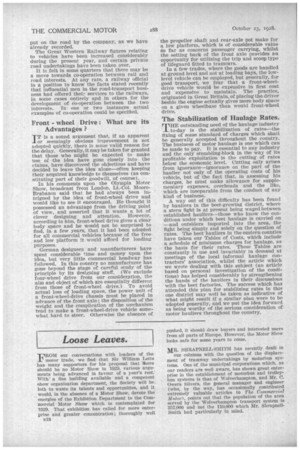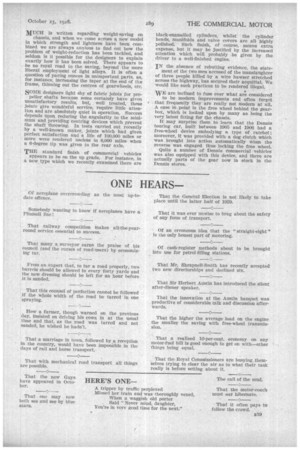Loose Leaves.
Page 2

Page 3

If you've noticed an error in this article please click here to report it so we can fix it.
TIROM our conversations with leaders of the motor trade, we find that Sir William Letts has many supporters for his .proposal that 'there should be no Motor Show in 1929, various arguments being advanced in favour of a year's rest.' With a fine building available and a competent show organization department, the Society will be loth to waste its talents and opportunities, and it would, in the absence of a Motor Show, devote the energies of the Exhibition Department to the Commercial Motor Show which is contemplated for 1929. That exhibition has called for more enterprise and greater concentration; thoroughly well D'S pushed, it should draw buyers and interested users from all parts of Europe. HOwever, the Motor Show looks safe for some years to come.
MR. SHRAPNELL-SMITH has recently dealt in our columns with the question of the displacement of tramway undertakings by motorbus systems. One of the municipal corporations which, as our readers are well aware, has shown great enterprise in the establishment of motorbus and trolleybus systems is that of Wolverhampton, and Mr. C. Owers Silvers, the general manager and engineer (who, by the way, has occasionally contributed extremely valuable articles to The Commercial Motor), points out that the population of the area served by the Wolverhampton transport system is357,000 and not the 110,000 which Mr. ShrapnellSmith had particularly in mind. MUCH is written regarding weight-saving on chassis, and when we come across a new model in which strength and lightness have been combined we are always anxious to find out how the problem of weight-reduction has been tackled, and seldom is it possible for the designers to explain exactly how it has been solved. There appears to be no royal road to the saving, beyond the more liberal employment of light alloys. It is often a question of paring ounces in unimportant parts, as, for instance, increasing the taper at the end of the frame, thinning out the centres of gearwheels, etc.
SOME designers fight shy of fabric joints for pro peller shafts because some certainly have given unsatisfactory results, but, well treated, these joints give wond&ful service, require little attention and are absolutely quiet in operation. Success depends upon reducing the angularity to the minimum and providing centring devices Which prevent the shaft throwing. In tests carried out recently by a well-known maker, joints which had given perfect satisfaction and a life of 100,000 miles or more were rendered useless in 6,000 miles when a 6-degree tip was given to the rear axle.
THE standard finish of commercial vehicles appears to be on the up grade. For instance, in a new type which we recently examined there are
black-enamelled cylinders, whilst the cylinder heads, manifolds and valve covers are all highly polished. Such finish, of course, means extra expense, but it may be justified by the increased attention which will probably be given by the driver to a well-finished engine.
IN the absence of rebutting evidence, the state ment of the two men accused of the manslaughter of three people killed by a wire hawser stretched across the highway, has secured their acquittal. We would like such practices to be rendered illegal.
WE are inclined to fuss over what are considered to be modern improvements and often forget that frequently they• are really not modern at all.
• A case in point is the free wheel behind the gearbox, which is looked upon by many as being the very latest fitting for the chassis.
It may surprise them to learn that the Dennis touring car, built between 1905 and 1906 had a free-wheel device embodying a type of ratchet; moreover, it was provided with a dog clutch which was brought into action automatically When the reverse was engaged, thus locking the free wheel.
Quite a number of Dennis commercial vehicles was also equipped with this device, and there are actually parts of the gear now in stock in the Dennis stores.


































